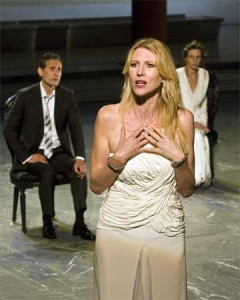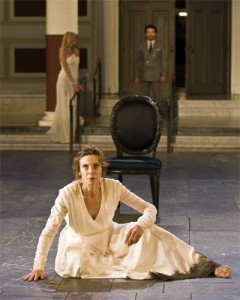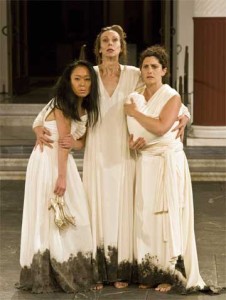Play (2011)
Created and Performed by Siti Company
Adapted by Jocelyn Clarke
Directed by Anne Bogart
Original Music Composed and Performed by Christian Frederickson
ArtsEmerson
Paramount Main Stage
Theater District, Boston, MA
April 17-21, 2013
With Ellen Lauren (Hecuba), Katherine Crockett (Helen), Makela Spielman (Andromache), Akiko Aizawa (Kassandra), Barney O’Hanlon (Chorus), Leon Ingulsrud (Envoy), J. Ed Araiza (Menelaus), Brent Werzner (Poseidon), Gian-Murray Gianino (Odysseus)

in “Trojan Women”
Photo: Craig Schwertz
Courtesy ArtsEmerson
At the end of the Trojan War, Hecuba, widowed queen of Troy, wife of the defeated Priam, is left, along with her daughter, Kassandra, and Andromache, the wife of the deceased hero Hector, among the ruins. Confronted with the challenges of godly forces, notably that of Poseidon, and the wrath of the conquering Greeks, represented by Odysseus, they crack in various ways. Also figuring prominently is Helen, wife of the Greek Menelaus, who was abducted by the Trojan prince Paris, which started off the whole tragically silly conflict.
Traditionally identified as a play in which not much goes on, but which nevertheless conveys a great deal of disgruntlement in the process, Euripides’ The Trojan Women has nonetheless had considerable appeal since the 400s BCE when it was written.
The current adaptation, which for some reason drops the “The” and is just called “Trojan Women” starts with Euripides and develops its own modifications. The adaptation, however, keeps quite close to the original tale and maintains its integrity as a classical drama. Though the program notes acknowledge many influences, including quite a few contemporary ones, this rendition is conservatively structured and seems to keep pace with the mood and disposition of the original telling.

in “Trojan Women”
Photo: Craig Schwertz
Courtesy ArtsEmerson
The overwhelmed and defeated tone of this production is constant and intense, not letting up much at all during its hour and a half.
Hecuba (Ellen Lauren) is the central figure, a focus of angst for Andromache and Kassandra, and a bitter critic of Helen. Ellen Lauren delivers a relentlessly anguished performance that expresses a gritty durability through the inevitability and insult of defeat. She cries, bleats, writhes and generally unravels her nerves as she coughs out the last bits of autonomy in her native land.
Katherine Crockett (Helen) is an elegant dancer who struts her loveliness with magnetic defiance and declaims endless wry excuses for her role in the Trojan War. Her elegant nastiness provides lithe balance against Lauren’s contorted and unwound Hecuba. They represent two ends of a spectrum along which the other Trojan Women, Kassandra (Akiko Aizawa) and Andromache (Makela Spielman), lie, in their own variations on anguish and distraction.

Ellen Lauren as Hecuba
Makela Spielman as Andromache
in “Trojan Women”
Photo: Craig Schwertz
Courtesy ArtsEmerson
There is something appropriate in the direness of this portrayal, particularly in the days after the Boston Marathon bombings.
The senselessness of murder and destruction reverberate through the climaxes of this play, as it has in Boston all week in the wake of the tragedy. Like an intense, dramatic dirge, Trojan Women evokes the feeling of destructiveness without the capitulation of defeat.
Hecuba, most notably, represents the grit and edge that rise above the pressures of tragedy to face the next steps, whatever they are. Facing the durability of the inevitable challenge, vividly conveyed during the ninety minutes of this intense and unrelenting outcry, is the one available positive option for minds bent towards freedom during times of great, overwhelming and seemingly insurmountable difficulties.
– BADMan
Leave a Reply